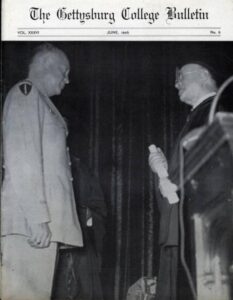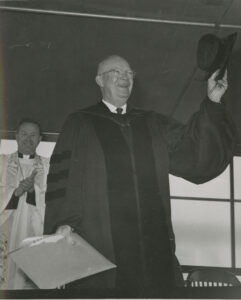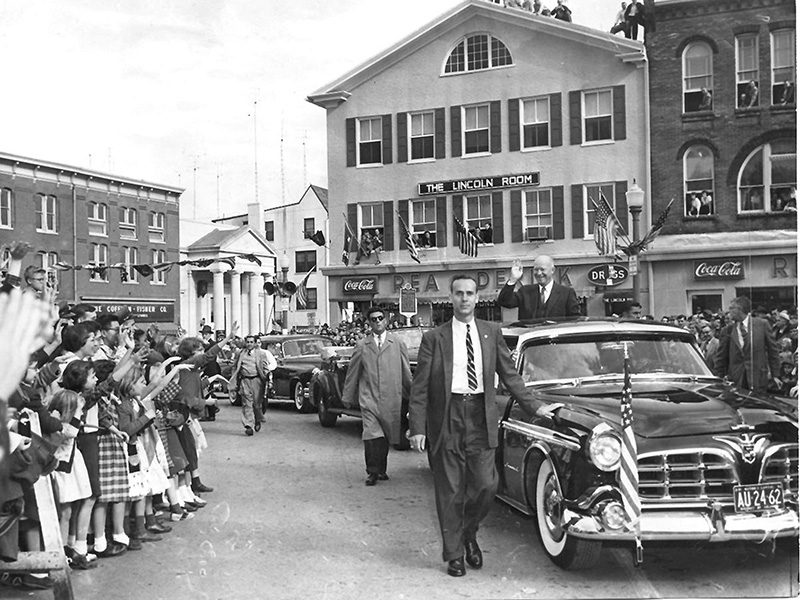In this most unusual of commencement seasons, I found myself looking back through Dwight Eisenhower’s speeches to college graduates, searching for some inspiring words as tribute for the remarkable cohorts of students graduating this spring.
Like many speakers, Eisenhower had a tendency to begin with a light-hearted introduction, sometimes poking fun at himself or his career. I have to imagine that some lines drew bemused groans rather than laughs, but they must have lessened the distance between the audience and the leader of the free world. At Dartmouth in 1953, he greeted the graduates by announcing “Your president possesses a brash bravery approaching foolhardiness when he gives to me this platform. . . . He has forgotten, I think, that old soldiers love to reminisce, and that they are, in addition, notoriously garrulous.” He apologized in advance for going over the time allotted—as if anyone would complain—then congratulated the students on their achievements.

A commencement address is meant not just to celebrate the accolades of the graduating class, but to frame them with a context that signifies their broader meaning at a moment in time. This weekend, President Obama provided just such a meaning by connecting the experience and accomplishments of HBCU grads to the ongoing work of justice and equality in America, especially in light of the disproportionate impact of COVID-19 on communities of color and the murder of Amaud Abery.
For Eisenhower, the dominant context of higher education was the ideological struggle between American democracy and Soviet communism. Ike consistently made the Cold War, and U.S. foreign policy, a centerpiece of his commencement addresses. At Penn State’s 1955 commencement, he reiterated the goal of nuclear cooperation as first put forward in his famous Atoms for Peace speech. In 1956, he contrasted Baylor’s religious identity with the “cruel, intolerant, materialistic” dogma of communism, while urging collaboration and even integration among sovereign states.
But while he proudly championed the values and leadership of the U.S., he also acknowledged what Lincoln called the “unfinished work” of American democracy. “Look at your country,” he said in 1953. “Here is a country of which we are proud. . . . . But this country is a long way from perfection—a long way. We have the disgrace of racial discrimination, or we have prejudice against people because of their religion. We have crime on the docks. We have not had the courage to uproot these things, although we know they are wrong. And we with our standards, the standards given us at places like Dartmouth, we know they are wrong.” For Eisenhower, universities prepared students to challenge their country to live up to the values enshrined in the Constitution rather than embody passive patriotism.

With this context in mind, Eisenhower laid out his philosophy on the necessary model of education for the postwar era. Rejecting the binary of technical education and the liberal arts, he advocated for an “integrated liberal, practical education for the same person” during his speech at Penn State, pointing to Benjamin Franklin and Abraham Lincoln as the embodiment of this ideal. “It is an education which helps each individual learn how to relate one relevant fact to another,” he said, “to get the total of relevant facts affecting a given situation in perspective; and to reason critically and with objectivity and moral conscience toward solutions to those situations or problems.” He reiterated this theme at his 1959 convocation address at Gettysburg College, in which he expanded on the need to learn to “distinguish between the common, long-term good of all, on the one hand, and convenient but shortsighted expediency on the other” in order to “support policies under which the nation will prosper.”
Despite his own short tenure at Columbia University, Eisenhower was the product of Abilene High School and West Point. His vision did not fixate on elite schools but acknowledged the diversity of the American education system. Even while president of Columbia, Eisenhower believed that “the principal purpose of education is to prepare the student for effective personal and social life in a free society. From the school at the crossroads to a university as great as Columbia, general education for citizenship must be the common and first purpose of them all.” His vision of education was broad and inclusive, as befitting a democratic superpower.
Indeed, Eisenhower was skeptical of the ivory tower and education for education’s sake. “No matter how much intellectual luggage we carry around in our heads,” he remarked in Gettysburg, “it becomes valuable only if we know how to use the information.” For him, education was key to informed citizenship. It was the training to prepare individuals in government, enterprise, and civil society to help facilitate international peace and cooperation. As he declared at Baylor, “The thorny problems of the time are scrutinized from many viewpoints. Solutions are approached by many avenues. Creative thinking is sparked. Mutual understanding is furthered.” Perhaps my favorite line from Eisenhower’s commencement addresses comes from the one he gave at Gettysburg College in 1946: “Democracy fosters leadership at every level.”
Congratulations to the Gettysburg College Class of 2020 and all students graduating this spring.
Additional sources:
Dwight D. Eisenhower, Address at the Centennial Commencement of Pennsylvania State University. Online by Gerhard Peters and John T. Woolley, The American Presidency Project https://www.presidency.ucsb.edu/node/232918.
Dwight D. Eisenhower, Address and Remarks at the Baylor University Commencement Ceremonies, Waco, Texas. Online by Gerhard Peters and John T. Woolley, The American Presidency Project https://www.presidency.ucsb.edu/node/232888.
Dwight D. Eisenhower, Address “Beyond the Campus” Delivered at the Commencement Exercises of the University of Notre Dame. Online by Gerhard Peters and John T. Woolley, The American Presidency Project https://www.presidency.ucsb.edu/node/234588.
